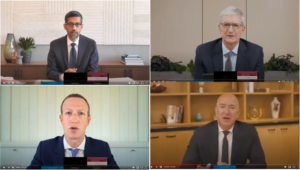Delving in Together – Look for the Helpers
Delving in Together – Look for the Helpers
Welcome To The Recovery
Welcome to our revamped, focused TL;DR weekly newsletter to help you navigate forward towards the recovery. We hope in the coming weeks this newsletter offers insights you can leverage to help your companies and industries to survive and thrive.
Subscribe to Receive Insights
"*" indicates required fields
As Fred Rogers (a/k/a Mr. Rogers) has said, “When I was a boy and I would see scary things in the news, my mother would say to me, ‘Look for the helpers. You will always find people who are helping.’” So to kick off our revamped newsletter, our research team went looking for the helpers among companies and industries that are making a positive difference in their communities.
Meet The Helpers
Across America, companies big and small are finding ways to make a difference during the coronavirus pandemic. For some, this effort means retooling their manufacturing to create desperately needed supplies. For others, it means continuing to deliver vital services, even as many customers can’t pay for them. Meanwhile, some companies have offered their goods and services for free, providing support to weary frontline workers and assistance to the general public navigating these uncertain times.
Even as they are concerned about their own financial future and the wellbeing of their employees, these companies are still seeking out ways to use their resources to help those in need. In doing so, all of these organizations have positioned themselves not only as good corporate citizens but also as creative problem solvers rising to the extraordinary challenges facing our country and our world.
Policymakers and the public are likely to remember these contributions after this crisis has ended, and there are already lessons to be learned. For one, in order for a lot of these charitable acts to occur, governments were forced to loosen or end regulations that had previously slowed companies’ ability to act. This recognition inevitably frames the debate for future reforms.
In addition, the pandemic has taught us the value of skilled government relations and public affairs operations. As many businesses and industries are seeking or have already received government support in this crisis, it will be important to show their helping efforts to underscore that this financial relief has been directed toward tangible public good.
We hope the below examples give you some ideas for how your teams, clients, and coalitions can make a difference during this challenging time.
Supporting Frontline Workers
- Some of America’s largest travel and hospitality companies are helping frontline workers get to the places where they’re needed most. Delta Airlines is covering the fare of eligible medical professionals as they travel to work in in COVID-19 hotspots, while Hertz is offering free vehicle rentals to health care workers traveling to the New York City area to serve patients during the pandemic. Once they arrive in New York, several area hotels will provide free rooms to health care workers to allow them to rest comfortably while protecting their families at home, including The Four Seasons, St. Regis, Yotel, Room Mate Grace, and The Wythe. Oxford Hotels & Resorts Group is offering free hotel stays and meals to medical professionals in Chicago and San Francisco, as well.
- Textile companies have quickly transitioned their day-to-day manufacturing to meet the urgent needs of medical personnel. Fanatics, which produces uniforms for Major League Baseball, is now using their Easton, Penn. plant to create masks and gowns for hospital personnel. New Balance, one of the nation’s largest athletic apparel retailers, has directed a portion of their U.S. manufacturing to produce prototypes for face masks at their Lawrence, Mass. plant and hopes to scale production at their other New England manufacturing centers soon. Meanwhile, Washington-based Eddie Bauer is also mass producing N95 and surgical masks for health care personnel, and Barco, which manufacturers uniforms, is donating 10,000 scrubs.
- Because medical personnel spend their days and nights on their feet, safe and comfortable footwear are in high demand. That’s why Crocs will donate 10,000 pairs of shoes to frontline medical workers daily. They have already made arrangements for a donation of 100,000 pairs.
- Frontline staff are reporting little time to cook for themselves after long, exhausting shifts. Now, hungry medical professionals can enjoy special complimentary treats from companies like Chipotle, Krispy Kreme, Starbucks, and Sweetgreen.
Meeting Critical Medical Needs
- As coronavirus patients flood health care systems across the U.S., businesses are using their existing products and capacities to ensure patients have what they need. In efforts to curb a potential hospital bed shortage, Serta has donated 10,000 mattresses to New York City hospitals, and they stand ready to produce 20,000 additional beds daily. In addition to their $10 million donation of equipment, Lowe’s is working with health care supply distributors to deliver essential items to hospitals most in need.
- Biomedical and pharmaceutical companies are foregoing profits to deliver life-saving technology and medicine for COVID-19 patients. Medtronic has released their patents, allowing their competitors to mass produce ventilators based off their blueprints. Meanwhile, Teva Pharmaceuticals and Novartis have pledged to donate a combined 136 million tablets of hydroxychloroquine to COVID-19 patients who consent to receive therapy regimens that contain the drug as a part of the Trump Administration’s “Right to Try” initiative.
- Throughout the country, companies are combining technology and expertise to deliver critically needed supplies. SmileDirect Club is now using their industrial 3D printers, typically dedicated to creating teeth-straightening devices, to print in-demand face shields and masks. With more than 47,000 industrial 3D printers on the market, other companies are likely to do the same.
Providing Relief for American Families
- As a result of the government-directed COVID-19 shutdown, nearly 10 million Americans have filed for unemployment. Millions more worry about their financial futures as bills begin to pile up and they’re uncertain when and if they’ll be able to go back to work. Financial service providers are working to relieve at least some of the stress associated with making ends meet during the coronavirus pandemic. For example, Wells Fargo has suspended residential property foreclosure sales, evictions, and involuntary auto repossessions. They are also donating $175 million to public health organizations and other non-profits addressing food, shelter, small business and housing stability needs. Bank of America will also give American families similar breathing room to pay their bills. Meanwhile, Goldman Sachs will give their online banking, Marcus, and Apple credit card customers an extra month to make payments without penalty or additional interest.
- In addition to concerns about paying their car notes and mortgages, many Americans fear being unable to keep on their lights. That’s why Duke Energy and Piedmont Gas have stopped all disconnections for unpaid bills. They will also waive late payment fees and fees for returned payments. Dayton Power & Light will do the same. These companies serve a combined 8 million households and businesses nationwide. To support similar efforts from utility companies across the U.S., Tennessee Valley Authority will make up to $1 billion in credit available to help local power companies keep the electricity on for customers unable to pay their electric bills during this time.
- For families and small businesses alike, the coronavirus pandemic has brought distinct organizational and administrative challenges. So, law firms across the U.S., like Arizona-based HKM, are providing free counsel via advice hotlines. Meanwhile, several business and accounting platforms are offering free help to small businesses dealing with COVID-19.
Is your company working hard to make a difference, and if so, how are you highlighting the good work you’re doing to policymakers, stakeholders and the public? Please drop us a line and let us know. And as always, we’re here to help.



